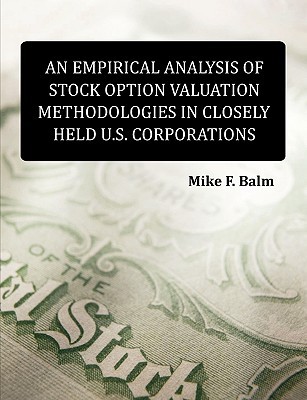
- We will send in 10–14 business days.
- Author: Mike Fred Balm
- Publisher: Dissertation.Com
- ISBN-10: 1599427192
- ISBN-13: 9781599427195
- Format: 18.9 x 24.6 x 0.7 cm, minkšti viršeliai
- Language: English
- SAVE -10% with code: EXTRA
An Empirical Analysis of Stock Option Valuation Methodologies in Closely Held U.S. Corporations (e-book) (used book) | bookbook.eu
Reviews
Description
The introduction of fair value accounting for stock options has required private companies to apply stock option valuation methodologies that were designed to be applied to their public counterparts. The two recommended methodologies, the Black-Scholes formula and the Binomial Lattice model, require the valuator to provide an input for estimated volatility; for private companies that do not have a trading history there is limited guidance regarding the determination of volatility, which results in diverging and incorrect estimates. Based on a sample representing 178 companies who filed and completed an IPO in 2006, this study analyzed the accuracy of the recommended valuation methodologies when applied to closely held US corporations. The study outlines the importance of volatility to the value of the options and proceeds to document, by comparing the private (pre-IPO) and public (post-IPO) data, that in 51% of the cases the volatility was either over- or under-stated by more than 10%. In addition, the study shows a bias towards overstatement in the less than 10% variance group. The study further demonstrates that a marginal change in volatility has a significant impact on the company's total stock-based compensation expense and consequently misstates earnings.
EXTRA 10 % discount with code: EXTRA
The promotion ends in 22d.17:30:32
The discount code is valid when purchasing from 10 €. Discounts do not stack.
- Author: Mike Fred Balm
- Publisher: Dissertation.Com
- ISBN-10: 1599427192
- ISBN-13: 9781599427195
- Format: 18.9 x 24.6 x 0.7 cm, minkšti viršeliai
- Language: English English
The introduction of fair value accounting for stock options has required private companies to apply stock option valuation methodologies that were designed to be applied to their public counterparts. The two recommended methodologies, the Black-Scholes formula and the Binomial Lattice model, require the valuator to provide an input for estimated volatility; for private companies that do not have a trading history there is limited guidance regarding the determination of volatility, which results in diverging and incorrect estimates. Based on a sample representing 178 companies who filed and completed an IPO in 2006, this study analyzed the accuracy of the recommended valuation methodologies when applied to closely held US corporations. The study outlines the importance of volatility to the value of the options and proceeds to document, by comparing the private (pre-IPO) and public (post-IPO) data, that in 51% of the cases the volatility was either over- or under-stated by more than 10%. In addition, the study shows a bias towards overstatement in the less than 10% variance group. The study further demonstrates that a marginal change in volatility has a significant impact on the company's total stock-based compensation expense and consequently misstates earnings.


Reviews